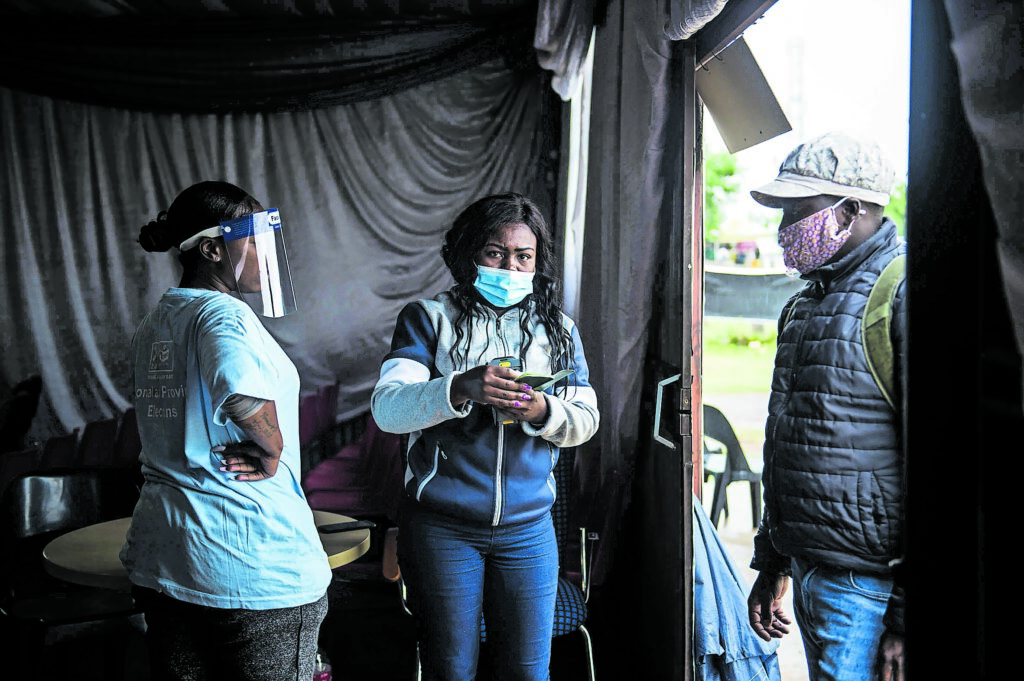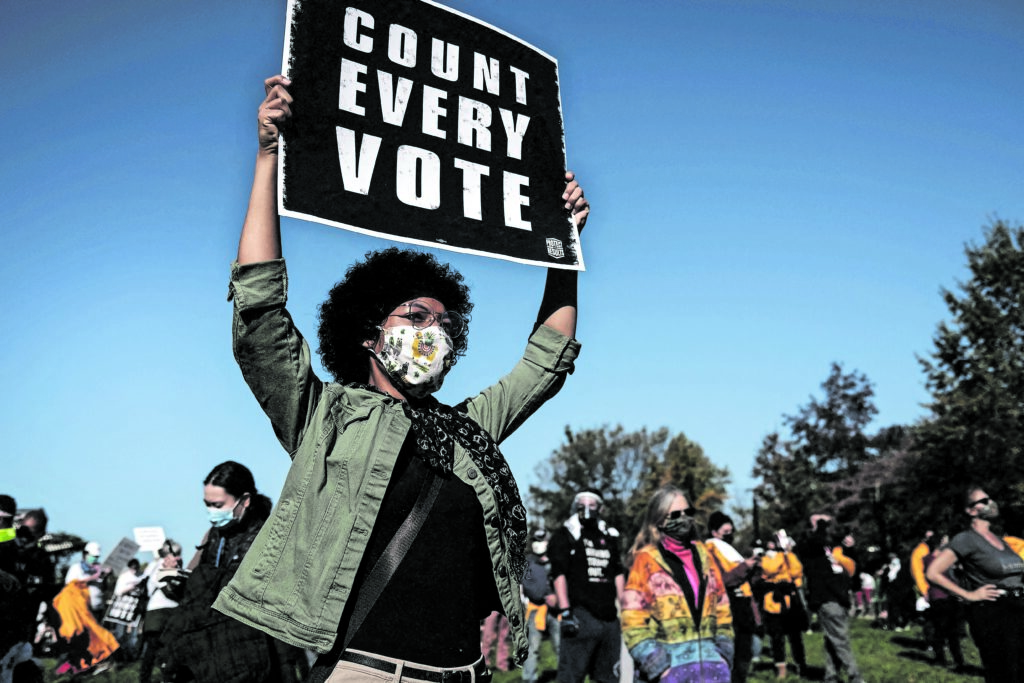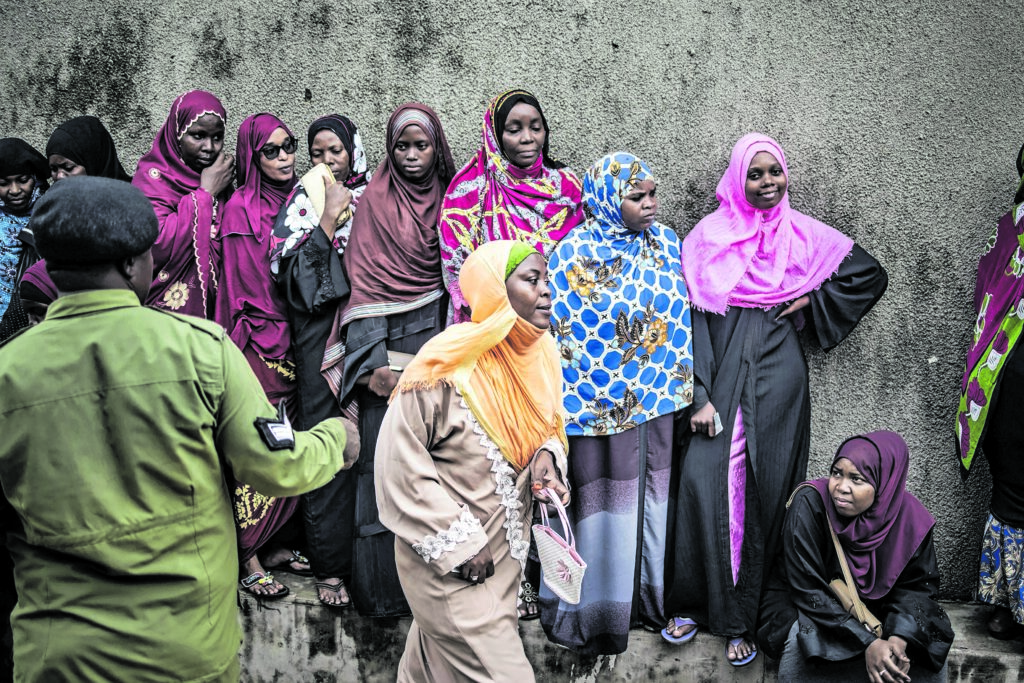Health and safety: Local government by-elections have taken place since the advent of the Covid-19 pandemic, but nationwide elections pose a much greater logistical challenge. Photo: Delwyn Verasamy
Pure Politics is our mission to better understand our democracy and how to improve the structures that underpin it. By going beyond media soundbites, we can all become more informed and active citizens.
On 27 April 1994 images of long, snaking voter lines in South Africa were broadcast to millions around the globe. It was a day that symbolised the freedom that so many had suffered to achieve; a moment the nation’s people would, for the first time in modern history, determine their own destiny.
We know why 1994 meant so much to so many. Elections are an immutable component of any democracy. The process embodies the very etymology of the word — rule by the people. Elections, more than any other measure, gauge how effective and true democracy is: without a process that is free and fair, our leaders lose all legitimacy.
Twenty-seven years after that historic day, we face a new threat. The global pandemic has swept any concept of normal out from under our feet. Our usual way of life, which includes our political practices, is no longer promised to us. And with local government elections due to take place later this year, that uncertainty presents a severe problem.
 Balancing act: Protocols for voters include bringing your own pen, sanitising and wearing a mask. The Constitution says that local government elections must be held by November. Photo: Delwyn Verasamy
Balancing act: Protocols for voters include bringing your own pen, sanitising and wearing a mask. The Constitution says that local government elections must be held by November. Photo: Delwyn Verasamy
But President Cyril Ramaphosa assured the public during his State of the Nation address that we will forge ahead with the polls by the end of 2021. “We will need to adjust to the conditions forced upon us by Covid,” he said.
Just how those adjustments will manifest remains unknown, but it is clear that the social-distancing markers of a Woolworths queue will not suffice. As long as vaccine roll-out predictions remain hazy, we have to assume authorities are looking at every possible option to prevent voting day from turning into a super-spreader event.
To vote, or not to vote
The answer of whether it may be just to postpone the local government elections is not a simple one — despite it being somewhat inevitable.
The Economic Freedom Fighters (EFF) have called for them to be pushed back ever since the virus arrived in the country. The party’s argument is that the occasion would represent a dangerous health risk, as well as jeopardise the democratic process, thanks to procedural delays caused by lockdown — the demarcation of wards, for instance.
Earlier this year EFF leader Julius Malema reiterated this call, announcing the party’s central command team had drawn up a concept document to take to the Electoral Commission of South Africa (IEC) detailing how the 2021 municipal elections could be consolidated with the 2024 national and provincial elections.
“To run elections in such a climate will, therefore, constitute an undermining of democracy, as well as putting the lives of society at risk,” Malema insisted.
The ANC has also demonstrated a willingness to entertain the idea of merging the two votes, but the other major parties in parliament have rejected the notion. Herman Mashaba’s Action SA has also been particularly vocal on the “ulterior motives” of those who would see the 2021 ballot postponed.
Although the debate on the merits of holding off the vote will continue, it’s constitutionally impossible to implement such a proposal. Chapter 7, clause 159 of the constitution states that the “term of a municipal council may be no more than five years … If a municipal council is dissolved in terms of national legislation, or when its term expires, an election must be held within 90 days.”
This offers a window between August and November to organise the election. A failure to do so would mean that members of municipal councils would be operating without a mandate from those they serve; in other words, democratic heresy.
The only way to go about a delay legally would be to change the constitution, which would require a two-thirds majority in parliament.
Options available to us
Currently, the IEC has a list of procedures and guidelines that it has implemented to protect voter safety during previous and imminent planned by-elections.
These are the minimum protocols of what you might expect: social distancing, bring your own pen, sanitising and so forth. It has also indicated there are plans afoot to engage with political parties in the near future.
Asked by the Mail & Guardian whether the commission is exploring additional ways to ensure voter safety during the local government elections, deputy chief electoral officer Masego Sheburi said: “By-elections were conducted in November and December 2020 during Covid-19. Delivering nation-wide elections during the pandemic remains a challenge.
“Health and safety protocols have been introduced into voter registration and voting procedures to mitigate the risk of transmission of the virus. However, the unknowns relate to the impact of the pandemic on voter turnout and demand for special vote home visits.”
It’s hard to gauge just how open the commission might be to adapting to new mechanisms later this year. With alternative remote voting methods in the spotlight globally, many have wondered if any of these might find a place on our own shores.
One method that has received recent global attention is mail-in voting, which was in the headlines thanks to the US elections. Mail-in or postal voting, replaces the need for in-person attendance with a ballot that is received and redispatched through the post.
Some states embraced the system as to encourage participation among those wary of venturing out during the pandemic, whereas others required a strong reason to be able to partake. Since November, it has been the topic of much discussion, with former president Donald Trump alleging that it tipped the scales against him.
 Former US president Donald Trump claimed that postal voting tipped the scales against him. Spencer Platt/Getty Images/AFP
Former US president Donald Trump claimed that postal voting tipped the scales against him. Spencer Platt/Getty Images/AFP
It’s unlikely, however, that this could prove a viable solution for South Africa.
“In recent years we’ve had issues with the postal service. I think we’re all aware of that,” says Isabel Bosman, a Konrad Adenauer Stiftung scholar at the South African Institute of International Affairs in 2020, whose research has focused on elections in the pandemic.
“It’s a very big logistical exercise and to ensure that everyone actually receives a ballot … I’m not sure about the feasibility of that option at this stage. I think that would require a bit more planning ahead, instead of swapping now,” she says.
We run into similar technical issues when we discuss other remote alternatives. Any system using the internet would likely prove impossible to implement between now and August, at least not safely and effectively. The infrastructure required would simply be too gargantuan.
There is also the social disparity of “the digital divide”. We have seen over the past year how a simple call to work from home can have huge ramifications for people who lack access to devices or connectivity. In such a scenario, we couldn’t begin to contemplate holding a fair election with an emphasis on technology.
This has proven to be true across the African countries that have gone to the polls over the past year, with many strategies implemented by the developed world simply unfeasible on the continent.
And if there is a group that would particularly feel this difference, it is those in self-isolation. Whether quarantining because of exposure or being infected with the virus itself, it would be undemocratic to remove this group from the process.
Israel solved the problem by special ventilated tents to these voters, mandating that they drive straight to the location without interacting with anyone else. Iceland went a step further by providing drive-by booths in which an individual could write down their choice and show an official through a closed window. In a country like ours, with a heavy reliance on public transport, neither of these would be an effective answer.
With potentially tens of thousands of voters facing this predicament — we can’t be sure that we won’t be at the peak of another wave when voting time comes — it is incumbent on authorities to explore all solutions.
“Obviously you don’t want to exclude such a person,” Bosman says. “You never want to run the risk of exclusion. So you can send medical workers, which I know has been done elsewhere, to assist that person to vote. South Korea has been doing temperature scans at its polling stations and then if someone runs a fever they have a separate voting area, so obviously there are risks of exposure attached to that.
“Or then the most sound option likely, but [one] that also contains risks, is proxy voting, where you can send someone as your representative to vote on your behalf.”
How proxy voting could look will likely have to be adapted to local circumstances, but the concept is simple: indicate what your preference is to a representative and give them authorisation to cast your vote.
Finally, another practical option that could be implemented without the need for drastic infrastructure overhaul is “early voting”. As the name suggests, the process would involve setting up different date parameters to accommodate the needs that arise.
Ghana, for instance, allowed essential workers to vote a week in advance so that they could be of assistance on the main day of national elections.
Dodging a crisis
Noxolo Gwala, an assistant programme officer at the Electoral Institute for Sustainable Democracy in Africa, was in Tanzania last year for an election that ran much like any other.
Tanzania’s President, John Magufuli, has long played down the threat of Covid-19. Last May he tested a goat and a pawpaw to prove that testing kits were not reliable and in January declared that the presence of God negated the need for foreign vaccines. (Incidentally, at the time of writing, the whereabouts of Magufuli are unknown, with multiple media reports suggesting he is in Nairobi being treated for Covid-19.)
But for much of the pandemic, the country carried on the same as ever — in fact, Gwala says, her mask-wearing South African group was under constant risk of attack from locals, who feared they had brought the virus with them.
 A Tanzanian police officer directs a woman at at a polling station in the outskirts of Stone Town, Zanzibar, on October 28, 2020. (Photo by Marco Longari/AFP)
A Tanzanian police officer directs a woman at at a polling station in the outskirts of Stone Town, Zanzibar, on October 28, 2020. (Photo by Marco Longari/AFP)
With no super-spreader fears to worry about, elections proceeded largely as normal. The only observable difference was water-filled Jojo tanks and soap at the stations.
Further north, in Uganda, a few months later, Gwala observed another election that similarly went on without consideration of a global pandemic.
With both elections plagued by concerns — including internet blackouts and opposition suppression — they have brought light to another danger, Gwala says. “You’re likely to get a disgruntled population that can then mobilise and create an even higher risk of Covid-19 transmissions in the aftermath because elections become contentious.”
Protests and gatherings represent a high risk of spreading the virus among large numbers of people. Although this is a democratic right, it would obviously be preferable to prevent faulty elections from compelling citizens to gather en masse.
South Africa, it’s fair to say, is unlikely to replicate what we’ve seen in Tanzania or Uganda; however, that doesn’t preclude it from having its voting process called into question. With the advocates of a delay having spent the past year trumpeting their cause, there is little doubt that any deficiencies will be ruthlessly pounced on.
“Parties might say, ‘What about some of our supporters who were in quarantine?’,” Gwala says. “The IEC has to think extremely hard on that. What preventive measures do you take to ensure people are not disenfranchised? How do you set up special voting to ensure at no time is there a rush to polling stations?
“I think it’s important to avoid as much as possible the possibility of a disputed electoral outcome. And the possibility of electoral fraud, where people find ballot boxes on the street and so on,” she says.
“As we know, these local elections are very much community-focused: people have more direct interest in seeing their choice of representative being respected. People are likely to know who they are voting for and will be more motivated to go out to the street.”
Preventing the legitimacy of our democracy being called into question would seem to be our highest priority. The people of this nation have spent the past 27 years toiling on the democratic project. It’s rarely been easy and often we’ve been confronted with leaders who have put their wants above the needs of those they serve. But we have always been able to fall back on the knowledge that it is us, the citizens, who have the power to hold them accountable.
We have no way of predicting what our situation will be in six months; nor do we have clear solutions to mitigate the more severe scenarios. What is clear is that this is a conversation that can’t be put off.